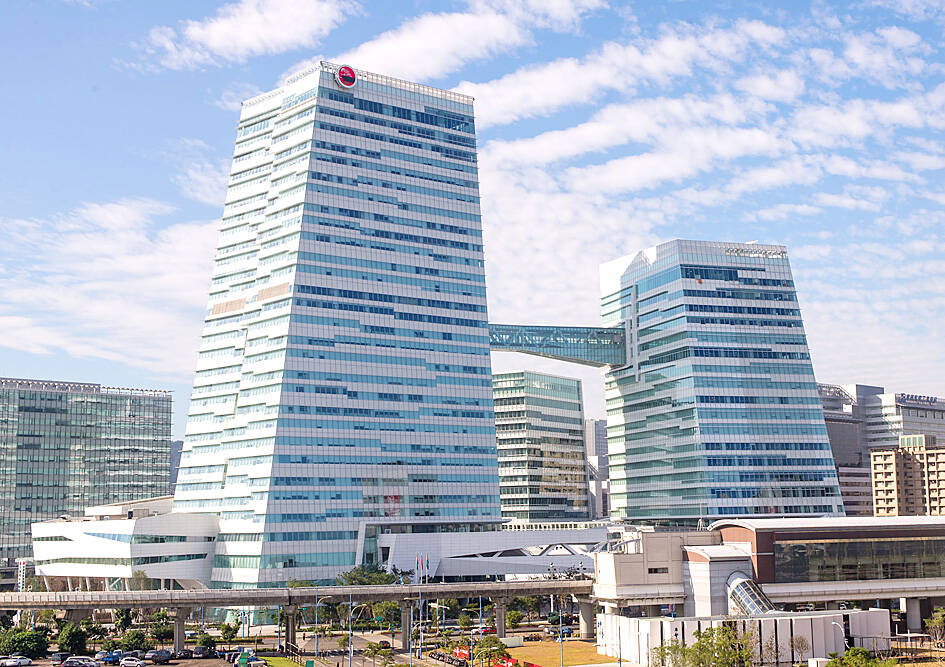CTBC Bank (中國信託商銀) was the only bank among the nation’s six “domestic systemically important banks” (D-SIB) that retained a capital adequacy gauge above the minimum requirements as of the end of June, data released last week by the Financial Supervisory Commission showed.
Five other D-SIBs failed to meet the requirements of 11 percent for a common equity tier-1 ratio, 12.5 percent for a tier-1 capital ratio and 14.5 percent for capital adequacy ratio, as set by the regulator due to the effects of volatile financial markets, the commission said.
CTBC’s common equity tier-1 ratio, tier-1 capital ratio and capital adequacy ratio stood at 11.7 percent, 13.29 percent and 15.15 percent respectively at the end of June, commission data showed.

Photo courtesy of CTBC Bank Co
These gauges provide regulators and investors with the information required to estimate whether a bank can withstand financial stress. To meet higher requirements, a bank usually boosts its core capital or reduces its loans.
The other five banks are Taipei Fubon Commercial Bank (台北富邦銀行), Cathay United Bank (國泰世華銀行), Mega International Commercial Bank (兆豐銀行), Taiwan Cooperative Bank (合庫銀行) and First Commercial Bank (第一銀行).
The commission said the five banks saw some or all of their capital gauges fall below the minimum requirements because of higher risk-weighted assets such as mortgages, or due to falling core capital like shareholders’ equity or retained earnings, it said, adding that banks should promptly improve their capital standards.
Banks in Taiwan reported an average common equity tier-1 ratio of 10.8 percent, tier-1 capital ratio of 12.03 percent and capital adequacy ratio of 14.22 percent at the end of June.

POWERING UP: PSUs for AI servers made up about 50% of Delta’s total server PSU revenue during the first three quarters of last year, the company said Power supply and electronic components maker Delta Electronics Inc (台達電) reported record-high revenue of NT$161.61 billion (US$5.11 billion) for last quarter and said it remains positive about this quarter. Last quarter’s figure was up 7.6 percent from the previous quarter and 41.51 percent higher than a year earlier, and largely in line with Yuanta Securities Investment Consulting Co’s (元大投顧) forecast of NT$160 billion. Delta’s annual revenue last year rose 31.76 percent year-on-year to NT$554.89 billion, also a record high for the company. Its strong performance reflected continued demand for high-performance power solutions and advanced liquid-cooling products used in artificial intelligence (AI) data centers,

SIZE MATTERS: TSMC started phasing out 8-inch wafer production last year, while Samsung is more aggressively retiring 8-inch capacity, TrendForce said Chipmakers are expected to raise prices of 8-inch wafers by up to 20 percent this year on concern over supply constraints as major contract chipmakers Taiwan Semiconductor Manufacturing Co (TSMC, 台積電) and Samsung Electronics Co gradually retire less advanced wafer capacity, TrendForce Corp (集邦科技) said yesterday. It is the first significant across-the-board price hike since a global semiconductor correction in 2023, the Taipei-based market researcher said in a report. Global 8-inch wafer capacity slid 0.3 percent year-on-year last year, although 8-inch wafer prices still hovered at relatively stable levels throughout the year, TrendForce said. The downward trend is expected to continue this year,

A proposed billionaires’ tax in California has ignited a political uproar in Silicon Valley, with tech titans threatening to leave the state while California Governor Gavin Newsom of the Democratic Party maneuvers to defeat a levy that he fears would lead to an exodus of wealth. A technology mecca, California has more billionaires than any other US state — a few hundred, by some estimates. About half its personal income tax revenue, a financial backbone in the nearly US$350 billion budget, comes from the top 1 percent of earners. A large healthcare union is attempting to place a proposal before

Vincent Wei led fellow Singaporean farmers around an empty Malaysian plot, laying out plans for a greenhouse and rows of leafy vegetables. What he pitched was not just space for crops, but a lifeline for growers struggling to make ends meet in a city-state with high prices and little vacant land. The future agriculture hub is part of a joint special economic zone launched last year by the two neighbors, expected to cost US$123 million and produce 10,000 tonnes of fresh produce annually. It is attracting Singaporean farmers with promises of cheaper land, labor and energy just over the border.